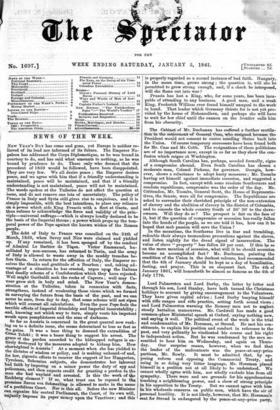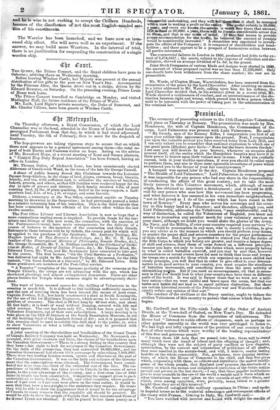Lord Palmerston and Lord Derby, the latter by letter and
through his son, Lord Stanley, have both turned the Christmas holidays to account by giving encouragement to the Volunteers. They have given capital advice ; Lord Derby busying himself with rifle ranges and rifle practice, setting forth sound views ; and Lord Palmerston warning the Romsey men not to neglect steady battalion manceuvres. Mr. Cardwell has made a good common-place Ministerial speech at Oxford, saying nothing new, and saying it well. The political event of the week is the trial and condemnation of Mr. Horsman, at Stroud. He met his con- stituents, to explain his position and conduct in reference to the past, and very gallantly he vindicated his course and his right to independent action. But he was condemned by the men as- sembled to hear him on Wednesday, and again on Thurs-
day. Our surprise ceases, however, when we find that the leader of the malcontents was the peace-at-any-price
partisan, Mr. Bowly. It must be admitted that, by op- posing reform and opposing the Commercial Treaty, and using in so doing very bitter language, Mr. Horsman placed himself in a position not at all likely to be understood. We cannot wholly agree with him, nor wholly exclude him from all sympathy. There were and are grounds for his apprehensions touching a neighbouring power, and a show of strong principle in his opposition to the Treaty. But we cannot agree with him in his wholesale censures on public men, which have the air of personal hostility. It is not likely, however, that Mr. Horsmares seat for Stroud is endangered by the peace-at-any-price party, and he is wise in not rushing to accept the Chiltern Hundreds, because of the disaffection of not them* English-minded sec- tion of his constituents.































 Previous page
Previous page